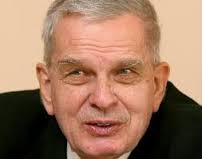O P I N I O N
◊

Tomas Venclova
Editor’s note: Our colleague Prof. Pinchos Fridberg drew our attention to a page on Radio Svoboda’s website, by Elena Fanailova, featuring both the audio and transcript of a recent interview conducted by Donata Subbotko for the Polish weekly Gazeta Wyborcza with the famed Lithuanian humanist, poet, essayist and professor Tomas Venclova. Text of the Polish version appears in Gazeta Wyborcza. The Russian text also appeared, at Prof. Fridberg’s initiative, in Obzor.
The following brief excerpt, concerning Banderism in Ukraine and analogous tendencies in Lithuania and elsewhere, has been translated into English (from the Russian) by Ludmila Makedonskaya. See also Defending History’s section dedicated to Tomas Venclova. Our page on bold Lithuanian truth tellers includes some of Prof. Venclova’s writings from the 1970s onward. His famous essay from the period, Jews and Lithuanians, is available in his collection of essays Forms of Hope.
◊
Donata Subbotko:
I would like to come back to Lithuania twenty years ago. What would you say about reproaches to the Ukrainians that they are to a great extent nationalists or that they let their nationalists take part in their country’s political life too actively? There are many fears that are broadcast by the media not only to Russia, but to Europe as well, and people in Europe are indoctrinated with the idea that there is rampage of nationalism in Ukraine. There are nationalists there, it’s true. Nonetheless, Ukrainian society copes with this pretty well. Do you think it can be compared with the wave of the old Lithuanian dissident nationalism? Or should we in some other way find new words for this in the modern world?
◊
Tomas Venclova:
You know, I have been to Ukraine, even recently. By the way, I’ve been to Crimea, to Ivano-Frankovsk, Kharkiv, Odessa. To tell the truth, I have not been to Donetsk and Lugansk, never in my life. Once I travelled through Debaltsevo, which then ended up getting mentioned in military communiques. I was in my own way interested to see that the town, which I saw with my own eyes, where I once, in Soviet times, dined in a restaurant, figures in such communiques. I can even more or less imagine the surroundings where it is happening.
Though I don’t know that part of Ukraine, I know Ivano-Frankovsk [in western Ukraine], for instance. I was not very impressed when I saw a statue of Stepan Bandera there.
I reckon Bandera hardly did good for Ukraine. On the contrary, I think, he did a lot of harm, for instance, by spoiling the image of the country and its national movement in the eyes of the whole world. We have the same problems in Lithuania. There were also people in Lithuania, who spoiled the image of the country badly in the eyes of the world, especially in 1941. There is a trend, perhaps even a prevailing trend in public opinion, which considers or wants to consider them national heroes. I don’t consider them national heroes. Though, you see, democracy is democracy. Everyone has their voice in democracy.
I don’t think wild nationalists dominate either in Lithuania or in Ukraine. It’s evident in Ukraine, where they get an absolutely negligible quantity of votes and don’t even make it to parliament. Thus, it’s much less serious than it might seem or seems to plenty of people in the West. Besides, they say, how is that, for half of Ukraine the heroes are the ones who fought on Stalin’s side in the Great Patriotic war; for the other half , those who fought on Hitler’s side. How can a country like this exist? And how does Spain exist? Half of the people there are Franco’s followers, the other half are former republicans. No big deal, they exist. How can a country exist, where half speaks Russian and the other half Ukrainian?
And how does Belgium exist, where half speaks Flemish, the other half French? No one says that the part to the south of Brussels and Brussels itself must be part of France. No, they can be part of Belgium as well. They also have problems there, though not such great ones; I was in Belgium, I saw their problems, it’s natural that being a Lithuanian I am inherently interested in inter-ethnic relations. Belgium is a single state, which speaks two languages.
As well as Latvia, for instance, a single state, in which a little less than half of the population speaks Russian. That does not mean it should split into parts. Nor does it mean that Ukraine should split into parts. For some Spaniards Franco remains a hero, for some others Dolores Ibarruri. No problem, the country lives on. That is the essence of democracy.